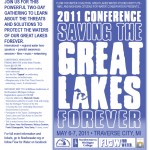Campaign kick-off: JULY 9!!!
Dear Save the Wild UP supporter,
We are writing to ask you to join and support a new campaign that SWUP (Save the Wild UP) with its partner, WAVE (Water Action Vital Earth), is organizing to halt development of the Kennecott Eagle Mine. It is called the UP Grassroots Campaign to Defend Our Water and Stop the Eagle Mine. It may well be our last best chance to do so.
The campaign is a joint venture of SWUP and WAVE. SWUP’s role will be largely administrative, and educational. It will serve as a clearing house for information about the campaign. WAVE, a new organization you may not be familiar with, is a collective, formed by members of the coalition opposed to sulfide mining. It will serve as the political arm of the campaign. It will be responsible for taking actions needed to accomplish the campaign’s goal and objectives.
We will fast, vigil, pray, do walks and consider other nonviolent means of expressing our distress at the continued development of the mine. We will support activities at Eagle Rock organized by members of the Keweenaw Bay Indian Community and other tribes. And we will use the campaign as an opportunity to consider how we will resist new mining projects in the sulfide ore rich western U.P. that Rio Tinto and other mining companies are planning.
The campaign is urgently required. Kennecott has indicated that it may begin underground construction of the mine as early as mid-September. It presently plans to blast the mine’s portal directly through Eagle Rock, a sacred site of the Annishinabe people. It has also become a symbol for all of us of the sacredness our precious, fragile ecosystem.
Please read the attached letter and respond as you feel appropriate. 2011 0618 FINAL Letter Final with LOGOS
Donations are made easy online via PayPal by clicking the DONATE button on the front page.
Make as generous a donation as you can to support this new, all out effort to stop the Eagle Mine. Thank you.
Sincerely,
Gail Griffith, President, SWUP
Catherine Parker, WAVE Spokesperson
 WaterLegacy is collaborating with Friends of the Boundary Waters to promote Sulfide Mining Awareness Day on June 22.
WaterLegacy is collaborating with Friends of the Boundary Waters to promote Sulfide Mining Awareness Day on June 22. 





